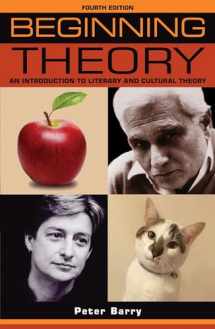
Beginning theory: An introduction to literary and cultural theory: Fourth edition (Beginnings)
ISBN-13:
9781526121790
ISBN-10:
1526121794
Edition:
4
Author:
Peter Barry
Publication date:
2017
Publisher:
Manchester University Press
Format:
Paperback
378 pages
Category:
Higher & Continuing Education
FREE US shipping
on ALL non-marketplace orders
Rent
35 days
Due Jun 09, 2024
35 days
from $16.96
USD
Marketplace
from $15.00
USD
Marketplace offers
Seller
Condition
Note
Seller
Condition
Used - Like New
Like new, gift quality condition. Our feedback says it all! Feel confident when you order from Hilltop Book Shop.
Book details
ISBN-13:
9781526121790
ISBN-10:
1526121794
Edition:
4
Author:
Peter Barry
Publication date:
2017
Publisher:
Manchester University Press
Format:
Paperback
378 pages
Category:
Higher & Continuing Education
Summary
Beginning theory: An introduction to literary and cultural theory: Fourth edition (Beginnings) (ISBN-13: 9781526121790 and ISBN-10: 1526121794), written by authors
Peter Barry, was published by Manchester University Press in 2017.
With an overall rating of 3.9 stars, it's a notable title among other
Higher & Continuing Education
books. You can easily purchase or rent Beginning theory: An introduction to literary and cultural theory: Fourth edition (Beginnings) (Paperback, Used) from BooksRun,
along with many other new and used
Higher & Continuing Education
books
and textbooks.
And, if you're looking to sell your copy, our current buyback offer is $3.39.
Description
Beginning theory has been helping students navigate through the thickets of literary and cultural theory for over two decades. This new and expanded fourth edition continues to offer readers the best single-volume introduction to the field.
The bewildering variety of approaches, theorists and technical language is lucidly and expertly unravelled. Unlike many books which assume certain positions about the critics and the theories they represent, Beginning theory allows readers to develop their own ideas once first principles and concepts have been grasped.
The book has been updated for this edition and includes a new introduction, expanded chapters, and an overview of the subject ('Theory after "Theory"') which maps the arrival of new 'isms' since the second edition appeared in 2002 and the third edition in 2009.
The bewildering variety of approaches, theorists and technical language is lucidly and expertly unravelled. Unlike many books which assume certain positions about the critics and the theories they represent, Beginning theory allows readers to develop their own ideas once first principles and concepts have been grasped.
The book has been updated for this edition and includes a new introduction, expanded chapters, and an overview of the subject ('Theory after "Theory"') which maps the arrival of new 'isms' since the second edition appeared in 2002 and the third edition in 2009.


We would LOVE it if you could help us and other readers by reviewing the book
Book review

Congratulations! We have received your book review.
{user}
{createdAt}
by {truncated_author}


